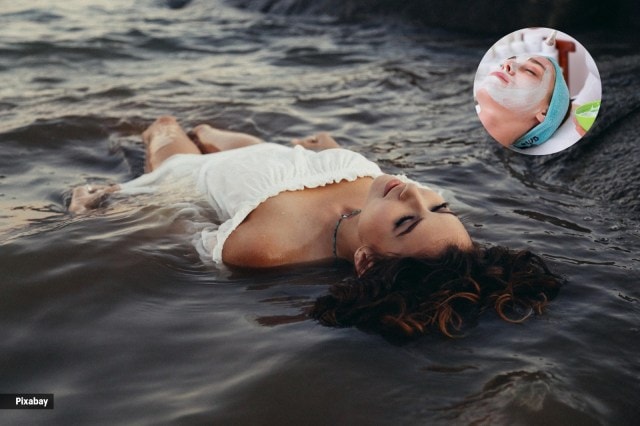📣 For more lifestyle news, click here to join our WhatsApp Channel and also follow us on Instagram
This is what happens to the skin when you float in the mineral-rich Dead Sea
Cleopatra is said to have used Dead Sea mud as part of her beauty regimen, making it one of the world’s oldest known skincare rituals.
 The high magnesium concentration in Dead Sea water helps reduce inflammation and supports the skin’s barrier function (source: pexels/unsplashed)
The high magnesium concentration in Dead Sea water helps reduce inflammation and supports the skin’s barrier function (source: pexels/unsplashed)The Dead Sea has always been a fascinating destination for travellers. The primary reason, of course, is the unreal experience of floating over this heavily salted water body like a quaky rubber duck.
However, the place is also a mecca for skincare. The Dead Sea wellness industry is a rapidly growing sector, projected to nearly double in size to USD 3.5 billion by 2035. In Israel alone, this health and beauty tourism generates around $300 million annually, supporting thousands of jobs in the region.
Both its water and mud are premium skincare elements, with more than 1,000 skincare products worldwide, ranging from face masks to body scrubs, and even pharmaceuticals.
How do Dead Sea minerals transform the skin?
The Dead Sea is rich in a rare mix of minerals and trace elements, including sodium, magnesium, potassium, calcium, zinc, bromine, and manganese.
Its salinity is a whopping 300 grams of salt per litre, making it almost 10 times saltier than regular seawater. This unusual concoction helps protect the skin against pollution, inflammation, breakouts and loosening.
Dr. Geetika Srivastava, dermatologist and founder of Influennz Clinic, explains, “The high magnesium concentration in Dead Sea water helps reduce inflammation and supports the skin’s barrier function. That’s why people with conditions like psoriasis and eczema often report noticeable improvements after treatment.”
 Dead Sea water is like a spa treatment in liquid form, rich in minerals that calm flare-ups and deeply hydrate the skin (image source: unsplash)
Dead Sea water is like a spa treatment in liquid form, rich in minerals that calm flare-ups and deeply hydrate the skin (image source: unsplash)
A 2018 study published in the International Journal of Dermatology confirmed the same. It says that short-term, regular exposure to Dead Sea minerals improves skin hydration, reduces redness and scaling, and calms chronic flare-ups. “Dead Sea water is like a spa treatment in liquid form,” it reads.
In fact, the surrounding mud is also a treasure trove of minerals, making it a popular ingredient in face masks. When applied to the skin, this potent mask cleanses pores, stimulates circulation, and exfoliates dead skin cells without harsh chemicals, as per Dr Srivastava.
“The Dead Sea’s minerals provide antioxidant protection. Zinc, sulphur, and manganese help shield the skin from free radicals caused by sun exposure, pollution, and lifestyle factors. This contributes to anti-ageing effects, improved skin tone, and better overall skin health,” she further adds.
 With nearly 10 times the salinity of regular seawater, the Dead Sea’s mineral cocktail offers anti-ageing, detoxifying, and healing benefits (image source: unsplash)
With nearly 10 times the salinity of regular seawater, the Dead Sea’s mineral cocktail offers anti-ageing, detoxifying, and healing benefits (image source: unsplash)
How much can your skin tolerate?
An unusually high mineral concentration makes the Dead Sea water quite a powerful potion. That’s why it is crucial to be mindful of the contact time, as overexposure to this salty cocktail can have unintended consequences.
“The optimal routine is around 15 to 20 minutes daily over two weeks,” advises Dr Srivastava. “This allows minerals to absorb without causing dryness, irritation, or flare-ups.”
Like any skincare ritual, moderation is the key here as well. Overusing it or applying it too frequently can lead to skin issues, especially in individuals with sensitive skin or metal allergies. One should also take caution and avoid splashing to avoid conjunctivitis.
Who should avoid Dead Sea treatments?
Dr Srivastava clarifies that while the Dead Sea water has multiple skin benefits, it isn’t suited for everyone. “People with open wounds, ulcers, compromised skin barrier, or known metal allergies should not take a plunge, ” she warns. Individuals with hypersensitive skin should also exercise caution, unless cleared to do so by their dermatologist.
Simple precautions before taking the plunge
Dr Srivastava recommends following precautions before a Dead Sea visit:
- Apply a thin layer of body oil to prevent over-drying.
- Always use sunscreen to protect against intense sun exposure.
- Set a timer to limit exposure to 20 minutes.
- Keep sensitive areas, such as the eyes and nose, away from direct contact.
- Know your skin type and any allergies you may have beforehand.
DISCLAIMER: This article is based on information from the public domain and/or the experts we spoke to. Always consult your health practitioner before starting any routine.
📣 For more lifestyle news, click here to join our WhatsApp Channel and also follow us on Instagram
- 01
- 02
- 03
- 04
- 05



























